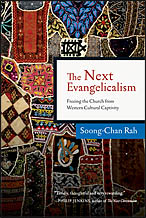 If you haven’t seen it yet, I strongly encourage you to check out my friend Soong-Chan Rah’s provocative new book, The Next Evangelicalism: Freeing the Church from Western Cultural Captivity. Today, African, Asian, and Latin American Christians make up 60 percent of the world’s Christian population. The United States and Europe will soon no longer be the center of evangelical activity in the world. With this in mind, the book calls the North American church to break free of its cultural captivity to a Western/Eurocentric/White American mindset and to embrace a new evangelicalism that is diverse and multiethnic. You can find out more here at the IVP site.
If you haven’t seen it yet, I strongly encourage you to check out my friend Soong-Chan Rah’s provocative new book, The Next Evangelicalism: Freeing the Church from Western Cultural Captivity. Today, African, Asian, and Latin American Christians make up 60 percent of the world’s Christian population. The United States and Europe will soon no longer be the center of evangelical activity in the world. With this in mind, the book calls the North American church to break free of its cultural captivity to a Western/Eurocentric/White American mindset and to embrace a new evangelicalism that is diverse and multiethnic. You can find out more here at the IVP site.
For those of you who don’t know him, Soong-Chan is a brilliant theologian and pastor who for years led Cambridge Community Fellowship Church, a multiethnic, urban, post-modern congregation in the Central Square neighborhood of Cambridge, Massachusetts. Now a professor at North Park Theological Seminary here in Chicago, Soong-Chan has rattled a lot of cages over the years by calling attention to issues of racism and cultural insensitivity in the evangelical church and community. I included a story about the Rickshaw Rally fiasco in my book, Reconciliation Blues, and I blogged about Soong-Chan’s role in the Zondevan/Youth Specialities controversy a couple years ago. In addition, when I was the editor of Today’s Christian, I published an insightful interview with Soong-Chan about the Youth Specialities episode and his ministry of activism. Though he may have gained a reputation as a rabble-rouser in some quarters, I know him as a kind-hearted, passionate man of God who loves the church and lost people.
We’re planning to do an interview with Soong-Chan about his book for that other little blog that I’m involved with, UrbanFaith.com. If you have any questions you’d like to hear Soong-Chan address about the book or his ministry in general, please leave them in the comments area below, or send them to me directly through my website. We’ll publish the interview in the next couple weeks, so send your questions soon. Thanks!


 Prison Fellowship president Mark Earley delivered a generous commentary about my book yesterday on the ministry’s
Prison Fellowship president Mark Earley delivered a generous commentary about my book yesterday on the ministry’s